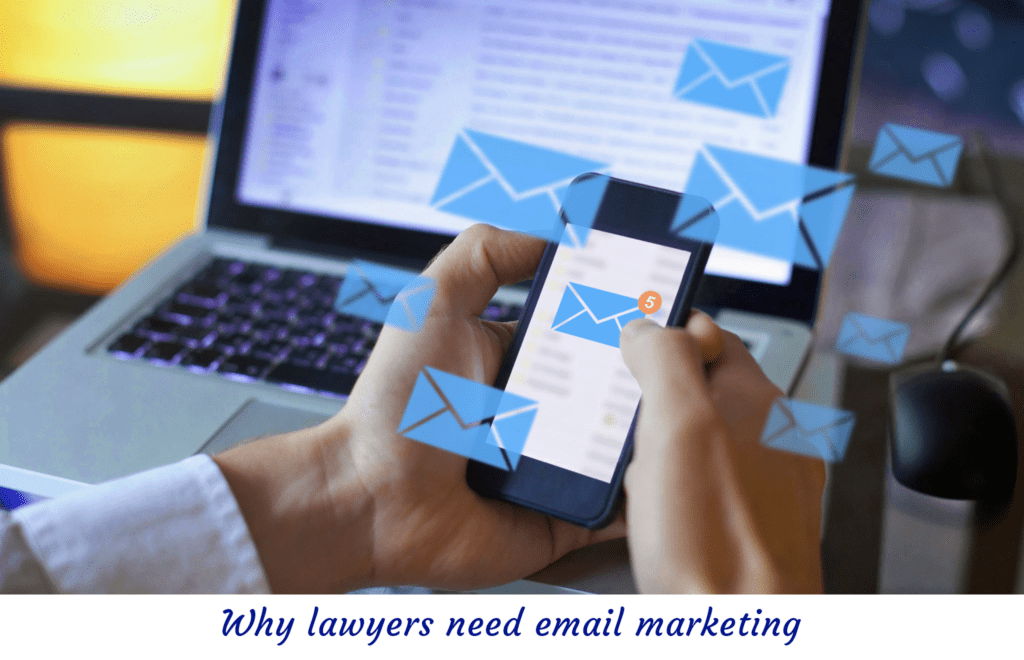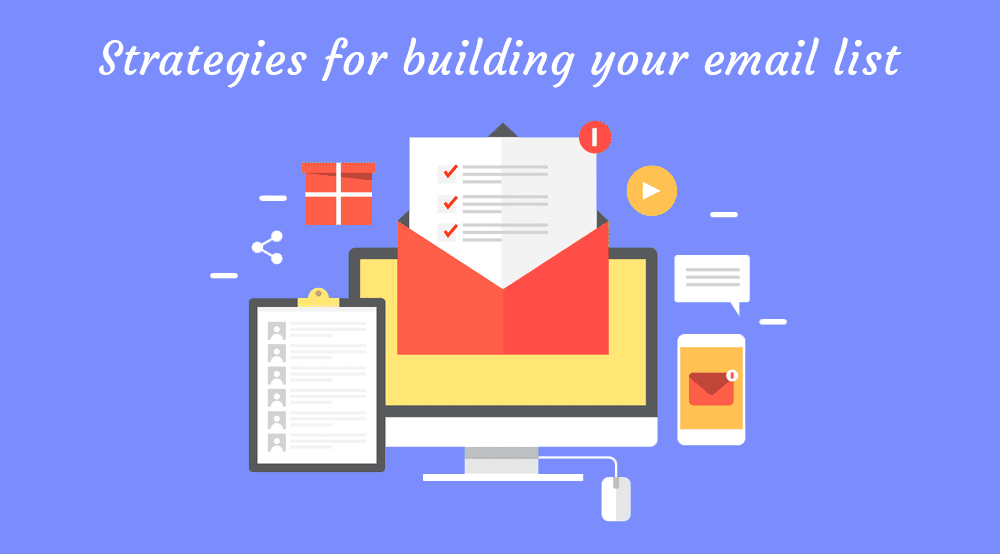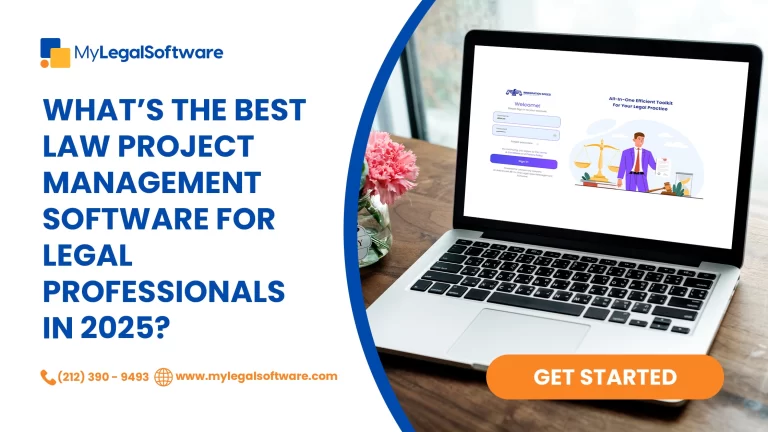One of the easiest and simplest ways to stay top-of-mind with your referral sources, clients and prospective clients is via law firm email marketing.
This article will guide lawyers to understand:
- Why email marketing is important for their law firm,
- Why lawyers need email marketing,
- 4 steps for lawyers to get started.
- Strategies for building your email list
- Overcoming the pitfalls
Why email marketing?
Studies indicate that email marketing campaigns boast a compelling ROI of approximately $40 for every $1 spent, leading 89% of marketers to utilise this strategy for lead generation.
For attorneys, email marketing emerges as one of the most recommended and effective marketing channels for law firms.

Why lawyers need email marketing:
When lawyers don’t leverage email marketing enough they miss out on a significant number of potential leads that competitors are capitalising on instead.
Despite the widespread adoption of email marketing by small businesses, some law firms may not be leveraging this powerful tool to its fullest potential. Therefore we Highlighted below 7 reasons why lawyers need to leverage law firm Email marketing:
High Return on Investment (ROI):
Email marketing for lawyers offers a remarkable ROI, with an average return of $36 for every $1 spent, outperforming many other marketing strategies.
Direct and Personalized Communication:
Email marketing allows lawyers to communicate directly with potential clients in a personalised manner, tailoring messages based on recipients’ interests and needs.
Builds Brand Awareness:
Through regular email communications, lawyers can reinforce their brand identity, establish credibility, and stay ahead of the competition and be first in mind for clients and clients.
Targeted Audience Segmentation:
Lawyers can segment their email lists based on factors such as practice areas, client interests, or geographic locations, enabling highly targeted messaging for better engagement.
Builds better lawyer-client Relationships:
Email marketing helps nurture relationships with existing clients, fostering loyalty and increasing the likelihood of repeat business and referrals.
Drives Website Traffic:
Email campaigns can direct recipients to specific landing pages or blog posts on the law firm’s website, increasing website traffic and engagement.
Lead Generation and Conversion:
Email marketing serves as a powerful tool for generating leads and converting clients into clients, especially when combined with compelling call-to-action (CTA) strategies. To know more about Lead generation for lawyers, read our guided on lawyer lead generation
Getting started with law firm email marketing
If lawyers can engage their email marketing correctly, they can get many more clients but, if they don’t, the reverse may be the case. So for lawyers to successful launch their email marketing campaigns, they need to know:
- who receives the emails
- who is on their email list,
- how they got there and,
- what category of contact this email list belongs to.
After knowing these things, there are 4 helpful steps to help lawyers develop an effective email marketing campaign and they are outlined below:
Lawyers should Identify the purpose of their email marketing efforts:
It is important for lawyers to understand the purpose of their marketing efforts before even drafting a single email message.
So often great lawyers spend so much time drafting email content for newsletters, client alerts or other communications without having a clear purpose in mind as to what the goal of their email marketing effort is.
For instance, lawyers can use email marketing as a nuturing strategy within a larger marketing strategy that they’ve developed.
So what do we mean by nurture?
It means that a typical email should be used by lawyers to engage their contact list and help them learn more about their law firms, their services and offerings.
Know their audience and make their email messaging relevant:
As mentioned earlier, Lawyers need to know who is on their email list. Are they past or existing clients, referral sources or clients? Were they contacts gotten via conferences, networking events, clients who sent their email to learn more about the lawyer’s services?
However this approach can all be done via email list management and proper segmentation, something the marketing team or an email marketing experts can help with.
Crafting a timely and relevant content:
After identifying the purpose of their email marketing efforts and who the target audience is, lawyers can start writing some content.
Crafting an email content has 3 phases:
- Structuring your content
- Writing your subject line and,
- Crafting your email message
Structuring your content:
The content structure depends on the link of your email communications.
For example, your email message style; Be it a digest-style email, a simple client alert, a newsletter or a combination of all these types of communications.
It is very important to strategies this before writing any part of your email content including your subject line.
There are Pros and Cons to all these styles of email communications but the key here is being consistent through out your messaging and make sure you stick with whatever style you have chosen.
Writing your subject line:
Be assured that “Nobody will read the body of your email if has a week subject line“. Remember, the subject line is what people see before opening any email.
So it is very important that is has a real meaning and purpose for the reader.
For instance, using a subject lines such as:
“CLIENT ALERT 2022”, It is unlikely that anyone will read the email content unless they are super loyal audience or employees of the law firm.
However, using more relevant subject lines like:
US regulators announce major shifts to oil and gas taxes or,
New privacy regulations your company maybe subject to. These are more relevant subject lines as they express value and give reasons why people should read them.
Moving on to part 3,
Writing your email content:
One of the big mistakes lawyers make is writting their content like it is a law journal.
Here are 3 tips and important aspects to writing a good email content:
- Use white space and apply paragraph breaks
- Use bullet points
- Make it concise
- Link back to contents on your law firm website
Measure and optimise your email campaigns
Lawyers may have figured out why they are emailing their lists, who they are emailing and what the content of these emails are but how do they know if their goals are aligned to something measurable.
It is impossible to know if the campaign is working if there is no way to measure it.
Moreso, It is important to know how to measure email marketing or how to improve on work done in the past.
This is where optimization comes in. It simply means; looking at the email campaign and seeing what is working, what is not and planning to adjust them accordingly.

Strategies for building your email list
Building an email list is a crucial step in growing your law firm’s online presence and nurturing client relationships. Here are seven top strategies for effectively building your lawyer’s email list:
Compelling Lead Magnets:
Offer valuable and relevant lead magnets to entice potential clients to subscribe to your email list.
Create downloadable resources like legal guides, e-books, or checklists that address common legal questions and concerns.
Optimized Website Forms:
Place prominent and user-friendly subscription forms on your law firm’s website.
Ensure they are strategically positioned on high-traffic pages and clearly explain the benefits of subscribing to encourage sign-ups.
Content Upgrades:
Enhance blog posts or articles with content upgrades that provide additional insights or downloadable resources related to the topic.
Require visitors to subscribe to access the upgraded content, effectively increasing email list opt-ins.
Webinars and Events:
Host webinars or live events on legal topics of interest to your target audience. Require registration for participation, gathering email addresses while providing valuable information to potential clients.
Social Media Engagement:
Leverage your social media platforms to promote your lead magnets, webinars, and valuable content. Encourage followers to join your email list to stay updated with the latest legal insights and news.
Networking and Partnerships:
Collaborate with other legal professionals or organizations to cross-promote each other’s content and offerings. This can expand your reach and attract relevant subscribers to your email list.
Contests and Giveaways:
Run contests or giveaways that require participants to subscribe to your email list for entry. Prizes can include consultations, legal services discounts, or gift cards, creating an incentive for potential clients to sign up.
Implementing these strategies effectively, will steadily help lawyers grow their email list with engaged and interested subscribers.
However, always remember to consistently provide valuable content and nurture relationships with your email list, fostering trust and loyalty among your audience.

Overcoming the pitfalls
Overcoming the pitfalls in any endeavour, including building a lawyer’s email list, is essential for achieving success.
Here are some key steps to overcome common pitfalls in email list building:
Avoiding Spam Traps:
To prevent falling into spam traps and damaging your email sender reputation, ensure that you obtain explicit consent from subscribers and follow email marketing regulations like GDPR and CAN-SPAM Act. Which means having an email compliance audit will help you analyze your data compliance and ensure your email program stays on the right side of marketing laws.
In essence, an email compliance audit aims to ensure that marketers are adhering to the requirements of relevant data privacy laws.
It specifically assists email teams in verifying that they have lawfully obtained and recorded contact details within their Martech stack, with explicit permission from each subscriber to receive marketing communications.
The audit further aids marketers in identifying the locations where subscribers’ information is stored in the business, facilitating the swift removal of data upon a subscriber’s request.
Additionally, the audit helps establish guidelines for the retention period of subscribers’ information, particularly if they become inactive.
Providing Valuable Content:
To prevent high unsubscribe rates, focus on delivering valuable and relevant content to your subscribers. Avoid sending excessive promotional emails and instead focus on informative and educational material.
Segmentation and Personalization:
Overcome the pitfall of generic email campaigns by segmenting your email list based on subscriber preferences, interests, or behaviour. Tailor your content to different segments, ensuring a personalised experience for your subscribers.
Mobile Optimization:
Ensure that your emails are optimised for mobile devices to avoid losing potential clients who primarily access emails on their smartphones or tablets.
Testing and Analytics:
Overcome the pitfall of stagnant email campaigns by regularly testing different email formats, subject lines, and content. Analyze email performance data to identify areas for improvement and refine your strategies.
Clear Call-to-Action:
Avoid the pitfall of low click-through rates by including clear and compelling call-to-action buttons in your emails. Encourage subscribers to take action and interact with your law firm.
Monitor List Hygiene:
Regularly clean your email list to remove inactive or unengaged subscribers.
This practice helps maintain a healthy email list and ensures that your messages reach an interested audience.
By proactively addressing these pitfalls, you can build and maintain a successful lawyer’s email list that fosters strong relationships with potential clients and contributes to the growth of your legal practice.







